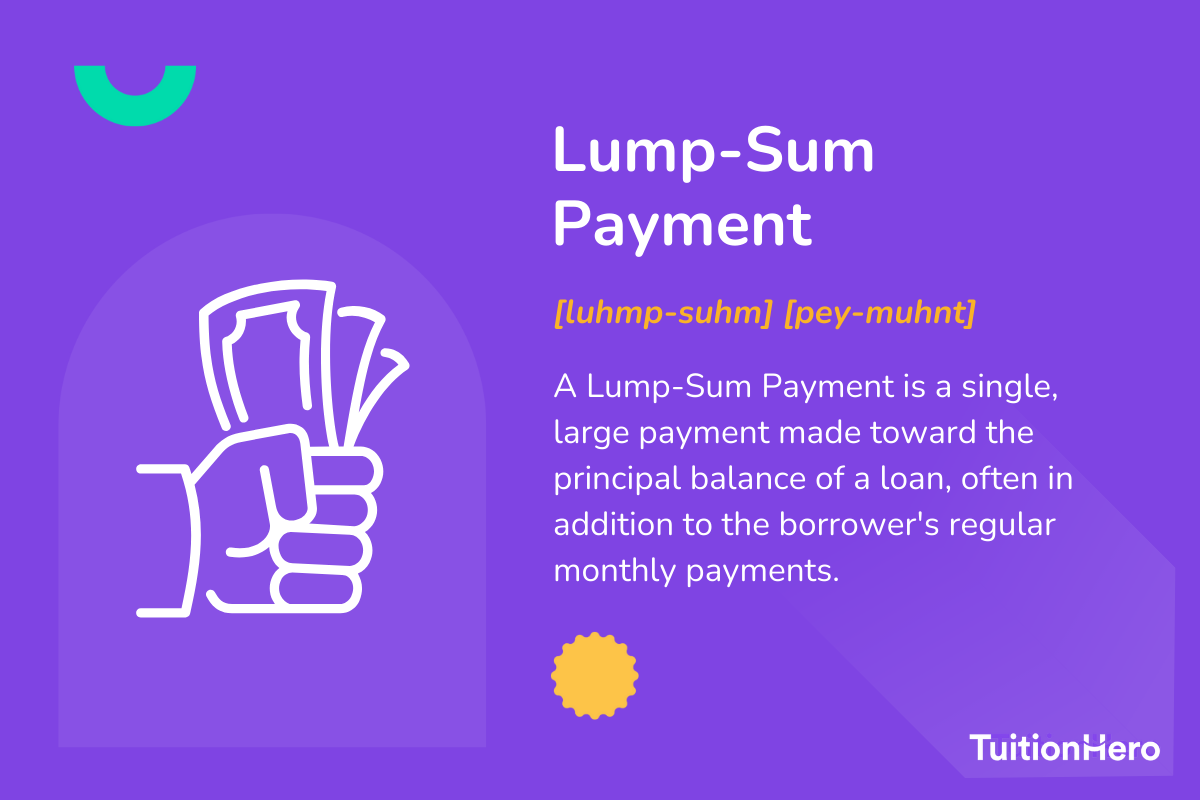Advertiser Disclosure
Last update: December 16, 2024
6 minutes read
What Does a Lump Sum Mean?
Do you know what a lump sum means for your finances? Learn how this payment choice can shape your financial path.

By Brian Flaherty, B.A. Economics
Learn more about our editorial standards



By Brian Flaherty, B.A. Economics
Learn more about our editorial standards
In today's financial landscape, understanding the concept of a lump sum can make a huge difference, especially when it comes to decisions related to student loans or refinancing. There's been a lot of buzz on whether it's wise to choose lump sum payments or spread the cost over time. In this post, we'll dive into what a lump sum payment is and why it matters. You'll find insights on making informed decisions, whether you're considering taking a new loan or refinancing existing ones.

Key takeaways
- Lump sum payments can offer savings on interest and fast-track debt freedom
- Choosing between lump sum and installments depends on your personal financial health
- Investments might benefit from lump sum contributions through potential compound growth
What does a lump sum mean?
A lump sum refers to a single, complete payment of money instead of breaking down the total into smaller, periodic payments. This term usually surfaces in discussions about loans, settlements, and investments.
Opting for a lump sum means you're choosing to address the full amount due, or to be invested, all at once, rather than distributing the cost over time. This approach can have many implications. For one, paying in a lump sum can lead to potential savings on interest in the context of loans or debts.
It means you're settling the principal amount earlier than planned, thus cutting down the interest that would have accrued over the extended payment period. However, this strategy requires that you have a large amount of cash at your disposal, which isn't always possible for everyone.

In my experience, a lump sum payment can be a powerful tool to help pay off student debt quicker and with less total interest paid. A few years out of college, I realized that I had saved more money than anticipated thanks to some unexpected work bonuses. I was able to allocate that money to my student loans in one lump sum payment - which helped drastically reduce my total balance owed.
On the flip side, receiving a lump sum, like a scholarship award or an inheritance, presents a different set of considerations. Here, the focus changes to how best to manage and allocate that large amount.
Whether it's paying off debts, investing for future returns, or covering immediate needs, the decision should align with your broader financial goals. Understanding this concept is crucial, and resources like refinancing student loans can provide further guidance on how a lump sum payment might fit into your financial planning.
Deciding between lump sum and installment payments
When faced with the option of lump sum versus installment payments, many find themselves at a crossroads.
Benefits of lump sum payments
Immediate financial relief is a big advantage. By choosing a lump sum, you eliminate the debt or obligation straight away.
This can be especially beneficial for student loans, where a lump sum payment may reduce the interest paid over time, therefore saving you money in the long run. For more insights on managing student loans efficiently, consider exploring how student loans affect credit scores.
If you’re planning to make a lump sum payment like this, make sure you understand any prepayment penalties associated with your loan. While student loans generally do not have prepayment penalties, other forms of debt, like personal loans, might have a fee if you deviate from your anticipated installment plan.
The case for installments
Conversely, installment payments offer a manageable and budget-friendly approach. They allow for financial flexibility, enabling people to allocate funds to different needs without draining resources at once.

TuitionHero Tip
This option might appeal to people not ready to part ways with a large sum of money immediately.
Lump sum in investments and savings
Considering lump sum payments in the world of investments and savings unlocks a different perspective.
Investments
A lump sum investment in the stock market or mutual funds usually works under the assumption that markets will trend upward over time. Putting a large amount into investments at once can potentially lead to higher returns compared to distributing the investment in smaller amounts. For a deeper dive into strategies that can help put education costs within reach, check out can going to college abroad save you money.
Lump sum investing can be smart because it gives your money more time to compound in your portfolio. Sometimes, though, spreading your investments out can also make sense. Making smaller regular contributions is sometimes called dollar cost averaging and it can be a good strategy if market valuations are changing a lot.
Emergency savings
A lump sum can also boost your emergency savings, acting as a financial protector against unexpected events. This preparedness promotes a sense of security, ensuring you're well-equipped to handle unexpected financial challenges. For more on managing finances, learn about what is a line of credit.
A well-considered approach to whether you should opt for a lump sum or installment payments depends on many factors, including your financial stability, future income certainty, and personal preferences. Weighing the pros and cons of each option in the context of your unique financial situation is crucial. In considering between lump sum and installment payments, it's essential to consider these factors in the context of your overall financial strategy and goals.
Compare private student loans now
TuitionHero simplifies your student loan decision, with multiple top loans side-by-side.
Compare Rates
Dos and don'ts of choosing a lump sum payment
Deciding on a lump sum payment can greatly affect your financial landscape. It's essential to weigh this decision carefully, considering all aspects of your financial health, goals, and the implications of choosing a lump sum over installment payments.
Do
Do consult a financial advisor to understand the full impact of your decision.
Do consider your future financial needs and whether you can meet them after the payment.
Do evaluate the interest savings that may result from a lump sum payment.
Do think about tax implications that might arise from your choice.
Don't
Don't rush into a decision without considering all financial ramifications.
Don't overlook potential investment opportunities that may offer better returns.
Don't underestimate the importance of maintaining an emergency fund.
Don't forget to consider how this choice affects your debt-to-income ratio.

Advantages and disadvantages of choosing a lump sum payment
Choosing between a lump sum and installment payments is a big financial decision that affects both your current financial state and future financial planning. It's a choice that deserves a deep dive into the potential benefits and drawbacks.
- Eliminates debt quicker, providing peace of mind
- Saves money on interest over the long term
- May provide tax benefits in certain circumstances
- Frees up monthly cash flow that would have been directed towards payments
- Depletes a large portion of available funds, potentially affecting financial flexibility
- May result in missed opportunities for higher returns through investments
- Requires a big upfront payment, which not everyone may have
- Can sometimes lead to overpaying for investments if market valuations are high

Why trust TuitionHero
At TuitionHero, we know college finance can be confusing, especially big decisions like paying all at once or bit by bit. We help students and parents with their finances by giving them lots of tools and resources. If you need private student loans, want to refinance smartly, are searching for scholarships, or figuring out FAFSA, we can help. We also know good credit card deals for students. Let's plan your money future together, so you can make smart choices at every step.
Frequently asked questions (FAQ)
Lump sum payments can greatly reduce the balance of your student loan, potentially saving you money on interest in the long run. This not only lowers the outstanding principal amount faster but may also shorten the loan term, letting you achieve financial freedom sooner.
Yes. Investing a lump sum in a college savings plan, like a 529 Plan, can offer the advantage of compound interest over time. The earlier the lump sum is invested, the more potential it has to grow, providing a substantial nest egg for future educational expenses.
The best time varies, but generally, making a lump sum payment before interest begins to accrue can save the most money, particularly with student loans. For investments, consider market conditions, but remember, early investments usually have more time to grow, benefiting from compound interest.
Final thoughts
Understanding the impact of lump sum payments versus installment options is crucial. Whether dealing with student loans, investments, or saving for future educational expenses, making informed decisions is key to financial well-being.
At TuitionHero, we’re ready to support you with a variety of resources and guidance to manage these decisions wisely. Learn more about managing your educational finances by visiting our student loans page.
Source
Author

Brian Flaherty
Brian is a graduate of the University of Virginia where he earned a B.A. in Economics. After graduation, Brian spent four years working at a wealth management firm advising high-net-worth investors and institutions. During his time there, he passed the rigorous Series 65 exam and rose to a high-level strategy position.
Editor

Brian Flaherty
Brian is a graduate of the University of Virginia where he earned a B.A. in Economics. After graduation, Brian spent four years working at a wealth management firm advising high-net-worth investors and institutions. During his time there, he passed the rigorous Series 65 exam and rose to a high-level strategy position.
At TuitionHero, we're not just passionate about our work - we take immense pride in it. Our dedicated team of writers diligently follows strict editorial standards, ensuring that every piece of content we publish is accurate, current, and highly valuable. We don't just strive for quality; we aim for excellence.
Related posts
While you're at it, here are some other college finance-related blog posts you might be interested in.
Shop and compare student financing options - 100% free!

Always free, always fast
TuitionHero is 100% free to use. Here, you can instantly view and compare multiple top lenders side-by-side.

Won’t affect credit score
Don’t worry – checking your rates with TuitionHero never impacts your credit score!

Safe and secure
We take your information's security seriously. We apply industry best practices to ensure your data is safe.
Finished scrolling? Start saving & find your private student loan rate today





